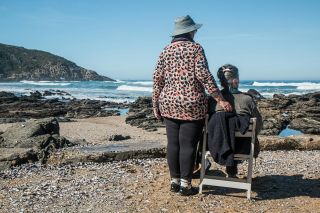Caregiving
"Living Far Away Is Unfilial": Caregiving Across Cultures
Caring for elderly parents can be difficult. Culture makes it more complicated.
Updated June 18, 2024 Reviewed by Ray Parker

Caring for an elderly family member can be a difficult endeavor. When care is provided across distances, including internationally, additional challenges arise. For example, culture(s) might shape the expectations regarding caregiving. Another stressor is the guilt associated with not being able to be in proximity to the ill family member. How might one cope with or respond to this type of guilt during an already stressful season in their life? I interviewed Minhee Cho, an LMFT, about her professional and personal insights on this topic. Not only does Minhee have a wealth of clinical experience helping clients who are learning to cope while caregiving, but she also has shared personal experience with me of taking care of an ill parent in Korea while residing in the U.S. True to the theme of my posts, our conversation occurred under the umbrella of cross-cultural (i.e., Korean), mental health/psychology, and religious (i.e., Christian) perspectives.
Paul Youngbin Kim: Why might someone feel guilty when providing care from far away? And how might cultural values that are emphasized in Korea compound things?
Minhee Cho: Guilty feelings arise because you care. You want to be present and accessible to your parents. You want to return the love and care you received from your parents. But the reality of the long-distance might mean that you cannot reciprocate this love and care.
The Confucian idea of filial piety (Hyodo:효도) is strongly emphasized in Korean society. While I believe it is an important cultural value that fosters respect and appreciation for the elderly, it can also amplify the guilt that adult children feel when they are unable to take care of their parents.
Take my example. The physical distance between my mother and me (5,168 miles) means that it is impossible to provide care daily or even regularly. If I lived closer to my parents, I could help them with practical things (e.g., taking them to hospital appointments, buying groceries, giving them a bath, and so on), but being so far away means that I am unable to do even these basic things.
Koreans like to say that living far away from parents is itself unfilial.
PYK: What are some unique stressors of caring for elderly parents in Korea from the United States?
MC: One major stressor is financial. In Korea, if you live far from your elderly parents who are sick and don’t have anyone nearby to help, you are expected to hire a personal caregiver who can take care of them 24/7. This service does not fall under the national healthcare system. You might have the good intention of helping your parents, but it is a big challenge to carry out this step of hiring a full-time caregiver. In my case, I fall under the “sandwich generation”—those who are paying for a child’s college tuition but also providing financial support to elderly parents.
Caregiving in Korea has gotten increasingly expensive. One estimate is that 3,700,000 Korean won ($3,000) per month is required to hire a personal caregiver for elderly parents; the same news article reported that 60% of the adult child’s income goes into paying for caregivers.
Another stressor is coordinating care among family members and coping with all the emotional and logistical aspects of it. When my mother collapsed one night, my sister had to move my mother to her bed by herself and call 911. This was a traumatizing experience for my sister, and she is still feeling the effects of the incident.
Some time ago, Korean people were shocked to read about a man who drove into the sea with his elderly mother, who was suffering from dementia. Without knowing much about their situation (and not excusing the action of taking his mother’s life), as I witnessed the strong criticism of the man by the online community, my heart felt heavy thinking about the complex emotional and financial toll that likely contributed to this man’s actions.
PYK: Do you have any suggestions for caring for elderly parents across international borders?
MC: I have several suggestions spanning intrapersonal, interpersonal, structural, and cultural domains:
- Allow yourself to grieve. I grieve about not being there for my mom when she is sick, plus Mother’s Day, my mom's birthday, and other holidays. I try to allow myself to process this grief and understand my emotions can be a constructive way to deal with feelings of guilt and helplessness.
- Rely on strength outside of the self. Recognize that many things in life are beyond individual control. For those of us who are religious, there might be spiritual principles that are especially helpful. For example, as a Christian, I am energized by God’s command to “honor your parents,” and this serves as the foundation for my filial piety.
- Visit often. Of course, this must be done within the bounds of what makes sense for your situation. But when in doubt, and you have the means to travel, err on the side of visiting. In Korea, a common greeting to an elderly person is, "How was your night? (밤새 안녕하셨어요?)” The unsaid message behind this greeting is, “I am glad to see that you are healthy and safe (nothing happened to you).” Each day is not guaranteed, especially for those who are elderly and in poor health. Show your filial piety (Hyodo) to your parents by visiting them.
- Seek communal or structural support. Are there government programs, for example, that might offset your costs? The Korean government provides support to those who are (a) aged 65 or older, (b) with dementia or serious illnesses (disability), and (c) need a caregiver. During one of my visits to Korea, I consulted with my sister to successfully apply for an assistance program for my mother.
- Foster a culture of expressing gratitude. An adult child’s efforts to take care of their elderly parents should not be taken for granted; it needs to be recognized, valued, and appreciated. We need to talk about the importance of mutual appreciation between parents and children. It is beneficial for both parents to express gratitude towards their children and vice versa, promoting a culture of reciprocal appreciation and respect.
- Collaborate with other family members. Family members must candidly discuss responsibilities and share the cost of care in terms of finances and time. My sister has been taking on more of the responsibility of taking care of my mom, but she eventually declared that she was unable to carry on the caretaking. So, I decided to travel more frequently to Korea. (I usually go once a year, but after my mom got sick, I decided to go at least twice a year.) Even if other siblings are nearby, if a parent's illness persists for a long time, it can be overwhelming for one sibling to be the sole caregiver.
- Engage in preventative efforts targeting elderly parents. In my parents' generation, mental and physical health were not emphasized. My parents have difficulty accepting their diagnoses and refuse to use assistive devices (e.g., a walker). Often, I have found that I must be firm with my parents when they refuse to use their medical devices. Top of form, educate parents to regularly visit the hospital for check-ups, maintain a balanced diet, exercise regularly, get enough sleep, and cultivate a supportive community. Finally, encourage parents to budget for potential hospital expenses in the future.




